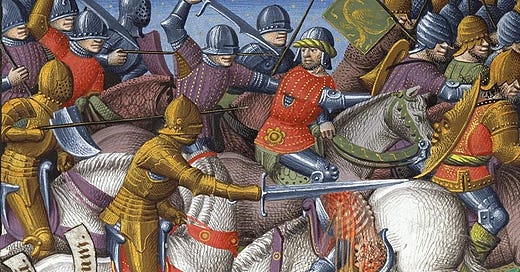If you are looking for the beginning of the study for The Song of Roland then you can go HERE for a brief introduction. At the bottom of the introduction you will find the links to each section of the study guide as it becomes available. If you would like to see the growing list of book studies available for free on this site you can go HERE. Enjoy!
Virtues/Vices/Great Ideas: (Find them in the Text)
Recklessness, Hope vs. Despair, Faith, Prudence, Vengeance
Grammar Questions: (The Information of the Text)
Who was in command of the paynims during the second onslaught against the French?
According to the text, why was the paynim Abisme “loved by King Marsile”?
How did Archbishop Turpin acquire his horse?
Which of the French peers was the first to die and who killed him?
In response to the loss of the first peer, what did Oliver do?
Who is the second French peer to fall in battle and who killed him?
How many of the French peers did Grandoyne kill? Name them.
Who avenges these fallen men of France?
How many of the 20,000 French soldiers are left shortly before Roland blows his horn?
What counsel did the Archbishop give to Roland and Oliver?
Logic Questions: (Interpreting, Comparing/Contrasting, Reasoning)
What might we infer about Marsile that he was not part of the first attack against the French?
Speaking of he and Oliver’s swords, what did Roland mean when he said, “Ne’er shall base ballad be sung of them in hall”?
Roland said of Oliver, “Fighter for fighter he matches me right well.” What did he mean by this and what might it communicate about Roland?
Why is Laisse 122 a significant turning point in the story? What does it indicate?
Why did the Saracens flee from the French even though there were so few of them left?
Why did Oliver not want Roland to blow his horn now?
Why did Oliver say what he did about his sister, Aude, to Roland?
What did Oliver mean by saying, “Your prowess, Roland, is a curse on our heads”?
Why was Turpin concerned that Roland and Oliver “have no quarrel” between them?
Rhetoric Questions: (The Analysis of Ideas in the Text)
The Archbishop encouraged the frightened French soldiers by saying, “To you stand open the gates of Paradise.” Should religion, even assurance of salvation, ever be used to encourage soldiers to fight bravely unto death? Don’t be quick to answer, pause and reflect on different possible scenarios and then respond carefully and thoughtfully.
Should ministers ever take part in battle as we see Archbishop Turpin doing? Why or why not?
Do you agree with Archbishop Turpin’s reasoning as to why Roland should blow his horn even now? Why or why not? What are the potential goods and ills of doing so?
Theological Analysis: (Sola Scriptura)
Read 1 Samuel 15. How might this passage affect our thinking about the role of Archbishop Turpin in The Song of Roland?



